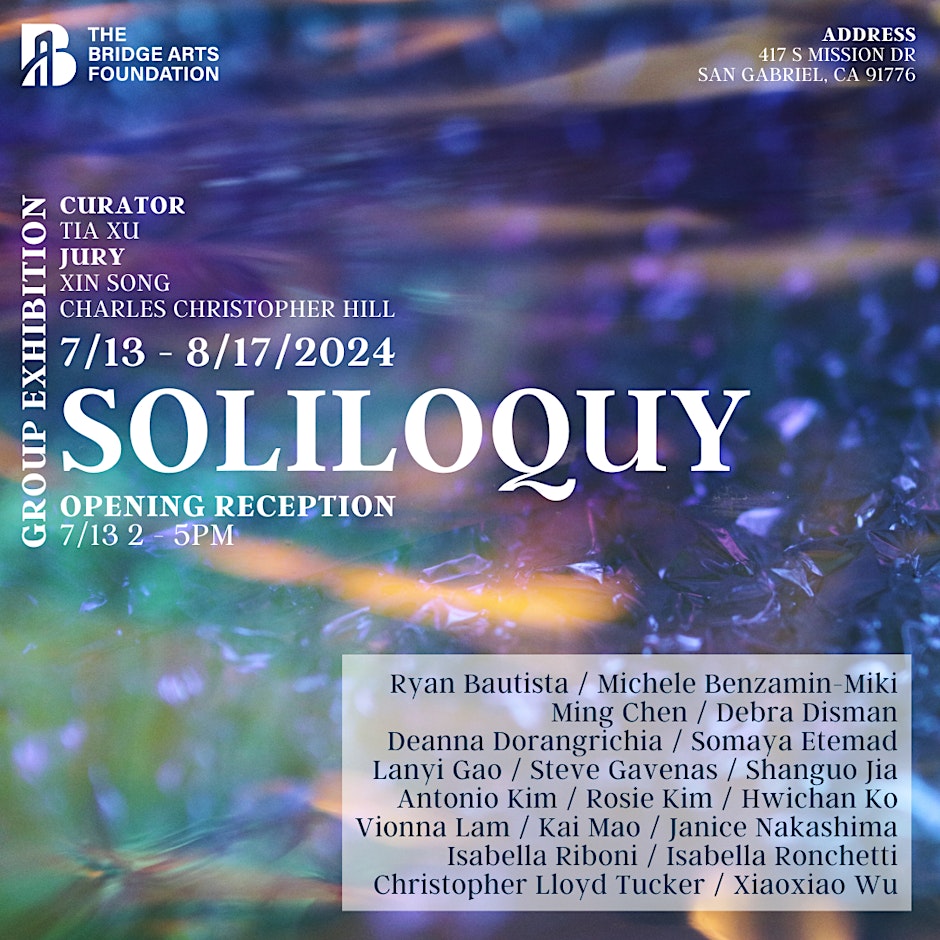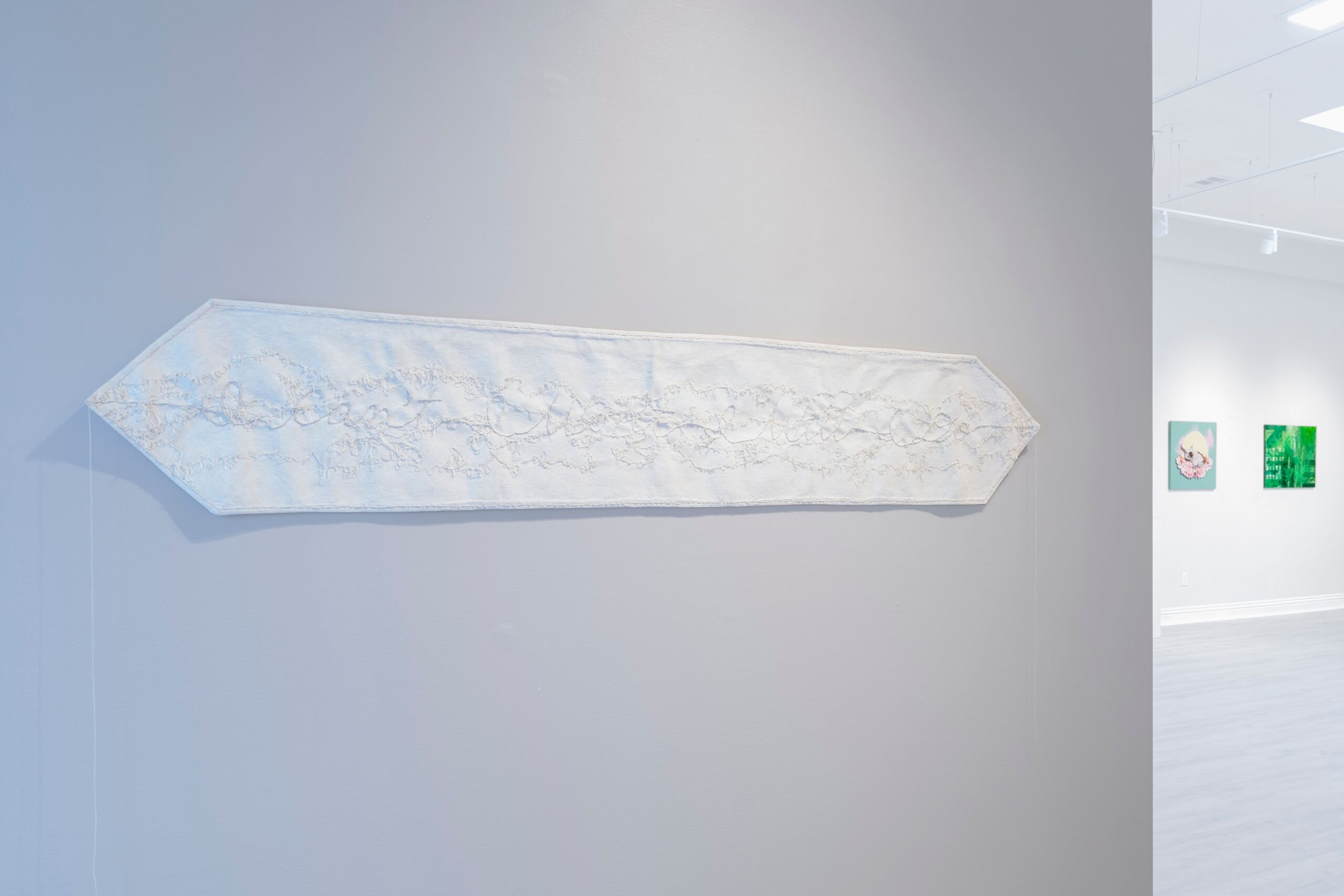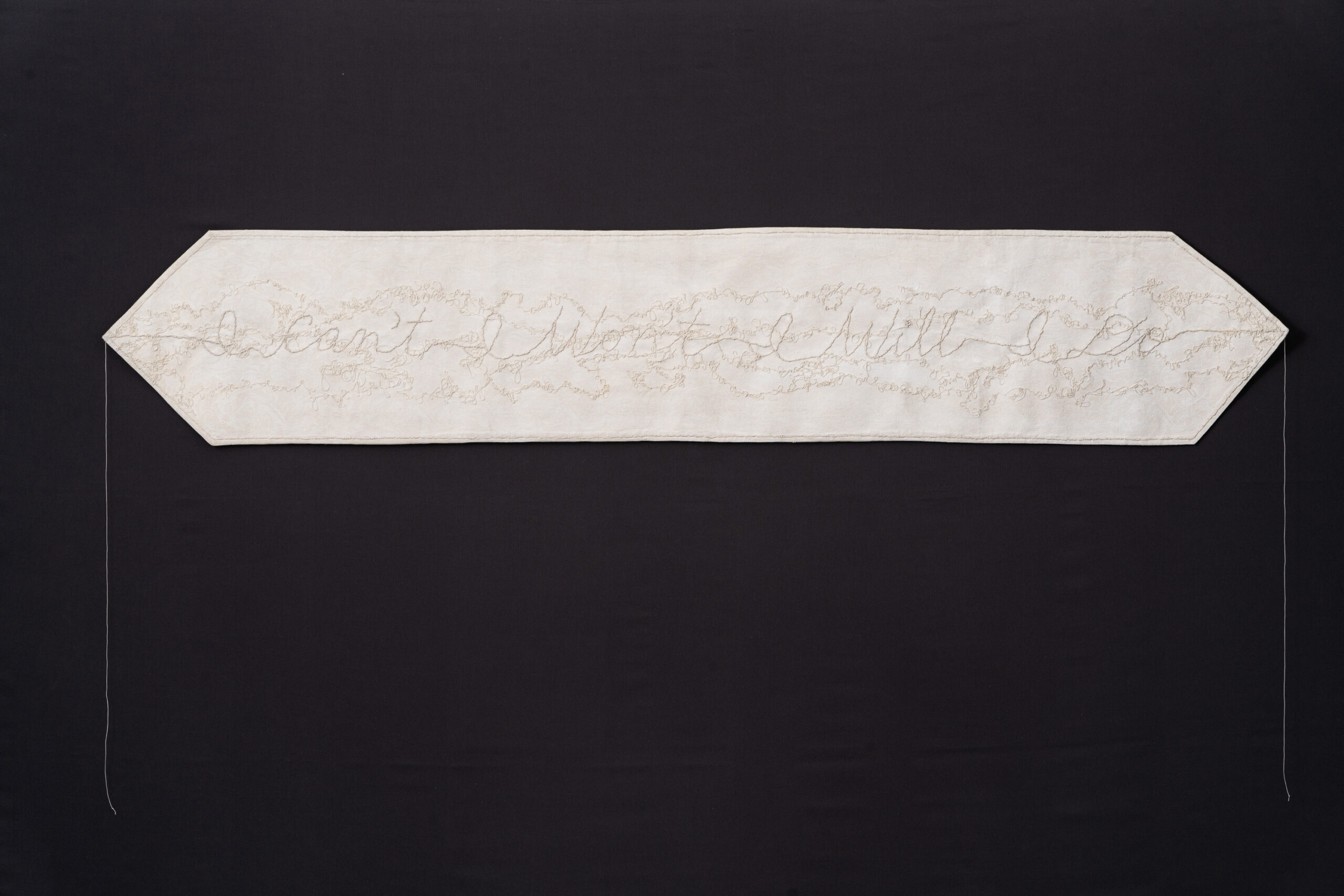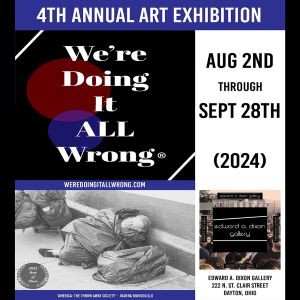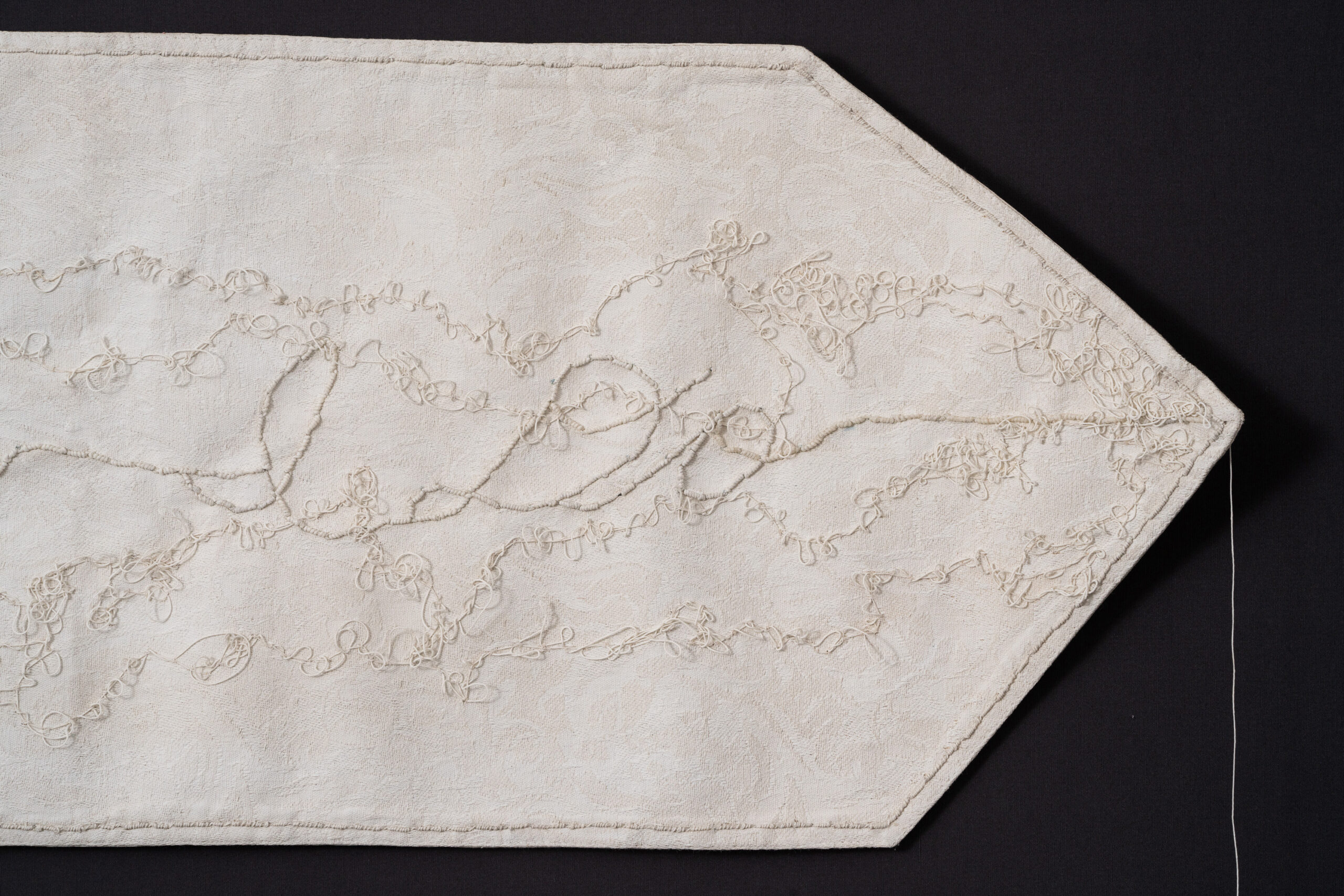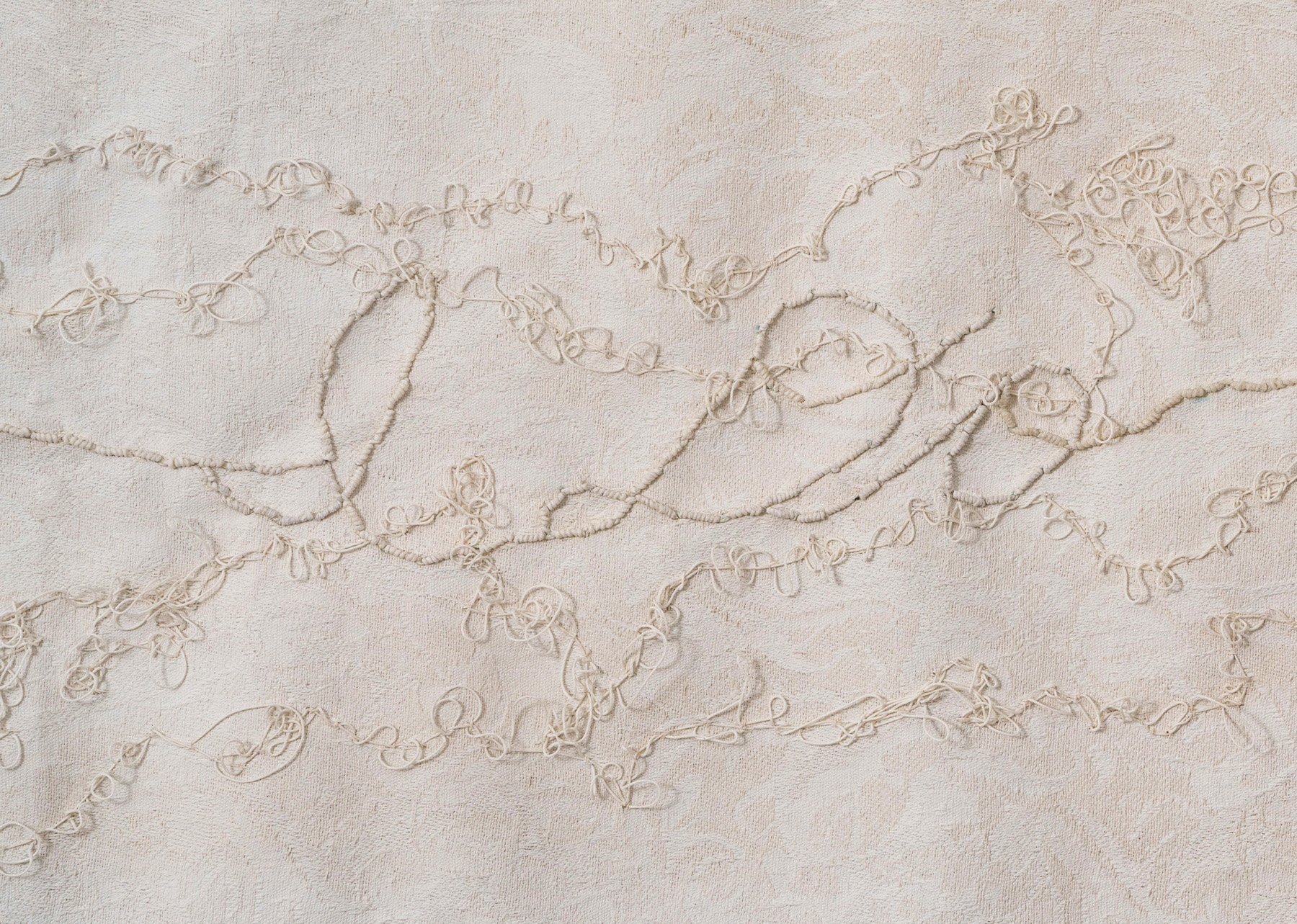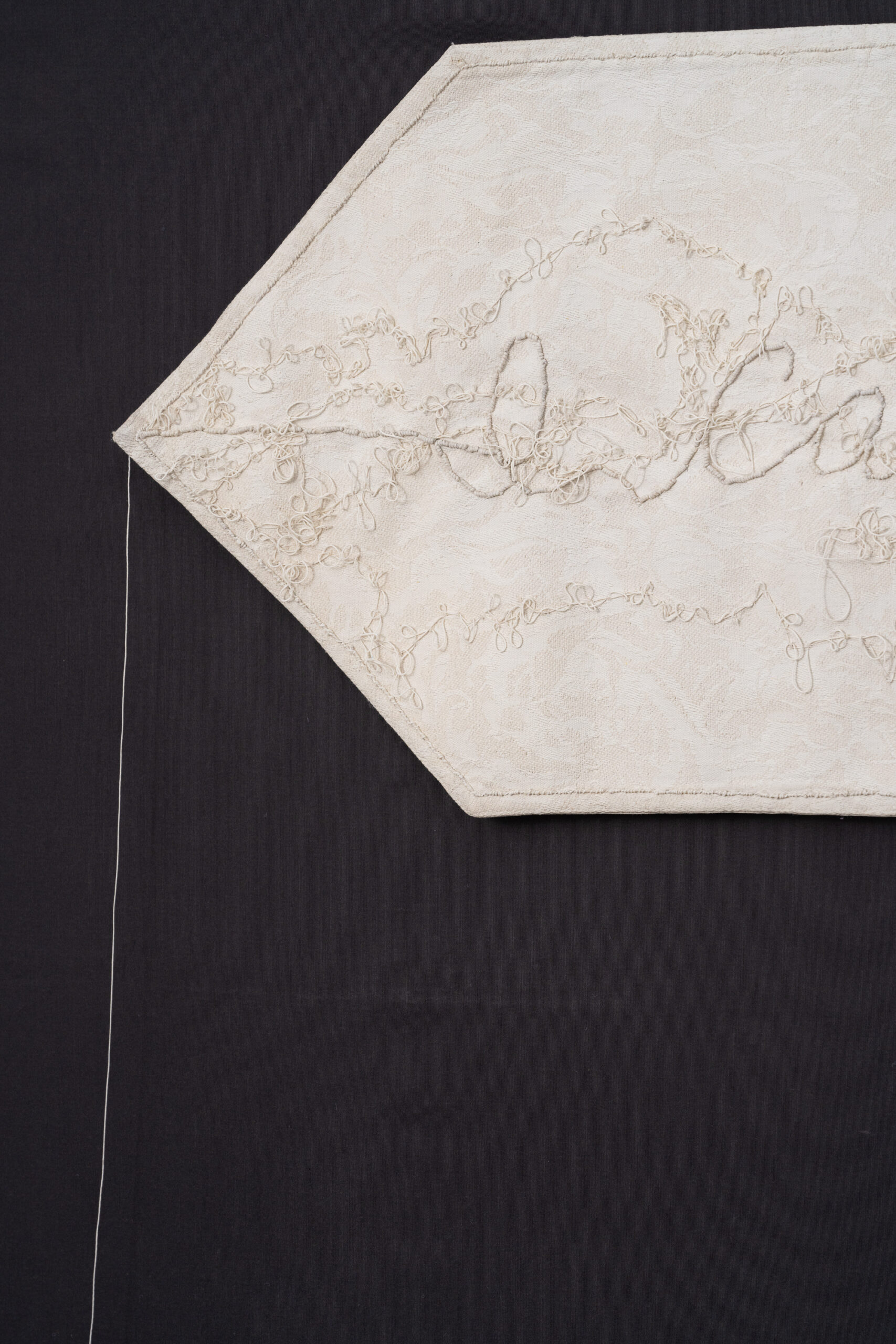Stitching Together Stories and Emotions: The Journey Through Textures and Threads
My interview with the Bridge Arts Foundation in conjunction with the exhibition, “Soliloquy”
Jul 28, 2024
Written By Tia Xu
Initiated and organized by The Bridge Arts Foundation, the ‘SOLILOQUY’ Open Call Exhibition is currently being held at The Scholart Selection Gallery in San Gabriel, California, and will run until August 17th, 2024.
Bridge Arts Foundation’s Art Director, Tia Xu, engaged in a conversation about the exhibition and art with several artists participating in this exhibition. In this interview, we have the pleasure of speaking with artist Debra Disman.
—— Q&A ——
Tia Xu: Could you please share your background and what inspired you to pursue a career in art?
Debra Disman: I have always created both visual and literary art, as it used to be called! Art and writing, image and text; my twin and intersection loves and passions: I have employed the written word in my work over time.
I majored in painting and minored in literature and creative writing, participating in the renowned Iowa Writers Workshop in Poetry at the University of Iowa. A year of study in Southern France sparked a love of travel and exploring other cultures that continues to expand and inform my work.
I have worked as a teaching, community, public and social practice artist all of my career, starting with volunteering with various organizations and communities in high school and college, then working over many years with museums, community organizations and educational institutions through grants, fellowships, residencies, visiting artist situations and as an employee and staff member teaching bookmaking and many forms of two and three-dimensional art and elements of art history.
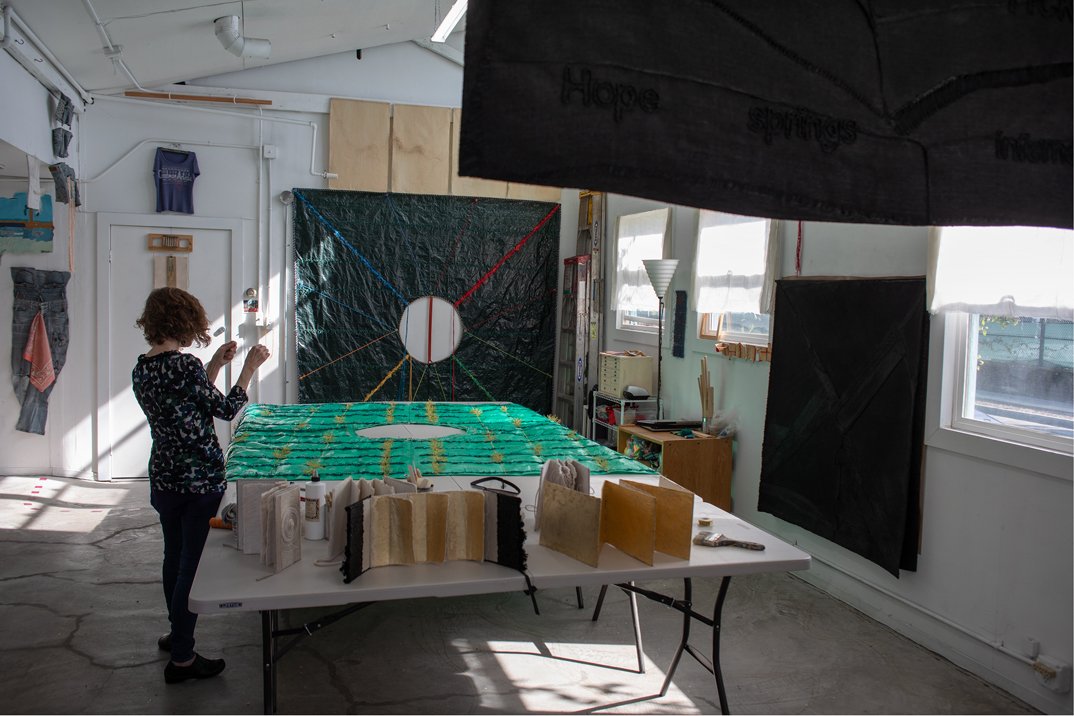
Photo: André Smit.
I created and conducted the grant-funded book and story writing program “The Art of Storymaking” through the San Francisco Public Library for five years, and have presented and taught the “We Write the Book” project at the Los Angeles Public Library supported by the LA Department of Cultural Affairs since 2017. For fifteen years I owned and operated ArtiFactory Studio as a sole proprietor, offering decorative painting, surface design, murals and color consultation to a wide assortment of clients, and learned much about business, entrepreneurship, management and networking that has held me in good stead in all further endeavors!
I have continued my education through certificate programs and groups in the Bay Area and Los Angeles, and am a devoted local artist in residence at 18th Street Art Center serving on the Community Council, and a proud member of The Guild of Book Workers (serving as board secretary), Textile Arts LA and the Surface Design Association.
Although my work has focused on the form of the book since about 2016, it has reached into textiles, sculpture, installation and even performance! I continue to integrate words and text into my textiles, fiber works, hanging and handmade books, and look forward to where this work will take me. I hope to offer the viewer and participant moments of solace, rest, contemplation and questioning through my work in all forms as we all move through this very tempestuous time in our world.
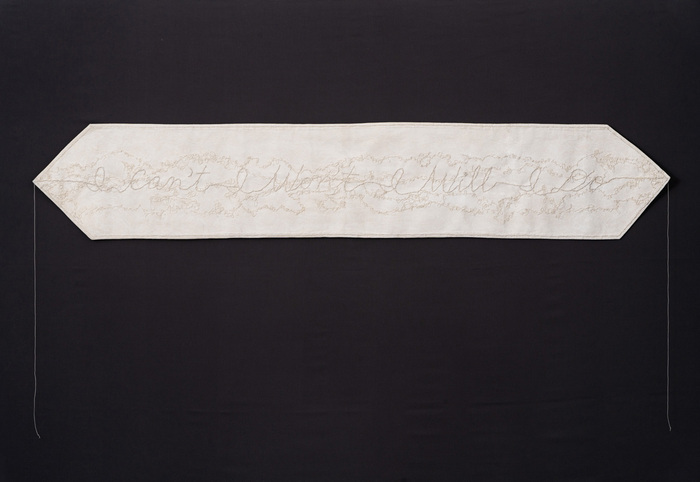
Debra Disman, “I Can’t I Won’t I Will I Do”, 2022, Repurposed cotton table runner, acrylic paint, hemp cord, 13 x 71.50 in (33.02 x 181.61 cm). Photo: Elon Schoenholz.
Tia Xu: What does “SOLILOQUY” mean to you, and how does your artwork explore this theme? Can you tell us the story behind your artwork from the exhibition?
Debra Disman: The term “SOLILOQUY” refers to the act of speaking one’s thoughts aloud to oneself, alone, or regardless of any listeners. Yet, to me, the very act of speaking out loud implies a desire to be listened to, heard, understood, perhaps even to have one’s words, thoughts and ideas embraced. As the writer Siri Hustvedt stated eloquently; “Art is always made for the other, the one who will look, and listen.” (paraphrase). We want to be seen, heard, understood, loved and embraced, and we reach out for this, even if we think we are speaking only to ourselves, or that we want only to speak to ourselves. I feel our work and our words are always, on some level, directed to others in a plea for care, receptivity, acceptance and understanding, otherwise why speak or express at all?
My work, “I Can’t I Won’t I Will I Do” is both a textural, and a textual tapestry, a “tactile textile” as the artist Annie Albers would put it. Through its words, textures/layers, tangled threads and monochromatic white on white coloration, it expresses the effort, energy, commitment, drive and will that is required to bring ideas to life through the creative act, and our initial resistance to this process which must be overcome.
We have to push through this resistance to achieve our vision. It is a journey from resistance and refusal to acceptance and realization, achieved only through maximum effort in working though each step, often in the dark! The stitched text and tangled threads run the length of the piece, depicting the commitment that is necessary to light the creative journey, which is often a long haul.
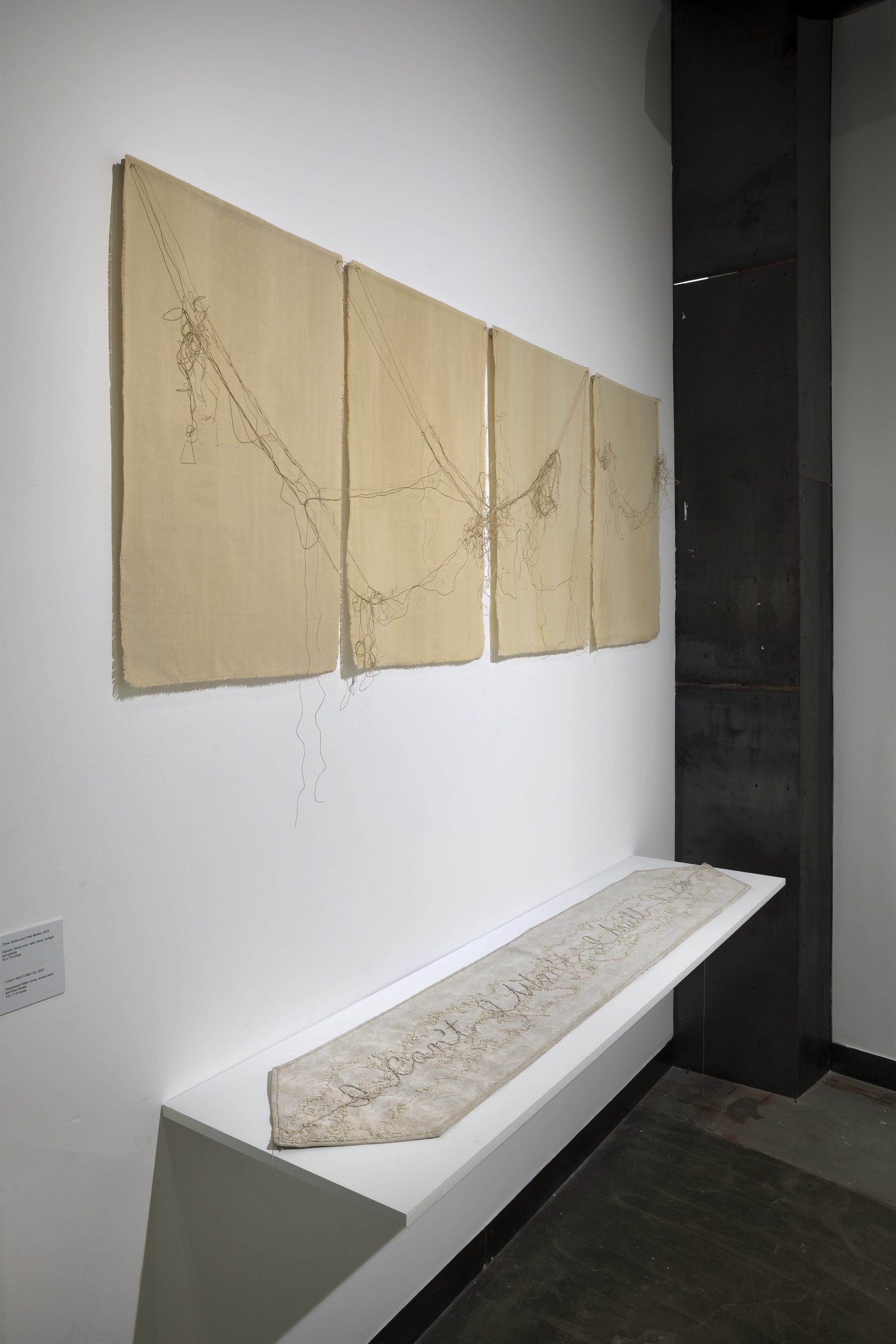
Photo: Gene Ogami.
Tia Xu: What materials and techniques do you prefer to use in your art, and could you explain your choices?
Debra Disman: Since about 2016 I have focused primarily on cloth, paper, thread, and cord. I also employ acrylic paint, and use pH neutral PVA/glue designed for bookbinding, even when I am working with textiles, cloth and fiber, as I have been doing increasingly over the last few years. I employ the materiality of fiber to engage the senses and invite altered ways of experiencing the world and our place in it, both soothing and confounding the eye with uneven visual repetition. Through this means of stabilizing and destabilizing, I hope to instigate fundamental questions that encourage an examination of what we think we know and are.
Devoted to material labor and the inherent substance, sensibility and tactility of the handmade, I love nothing more than to be immersed in material manipulation, which inevitably yields some kind of distilled meaning. The evocative, visceral and profoundly physical quality of materials drives my work, permeating and charging it with emotional resonance. I am compelled to bundle, braid and bunch, tangle, twine, twist and tie, layer, loop, wrap, wind, stitch, sew, knot and glue, as well as paint, draw and write, intuitively developing, complicating and disrupting the surface to add levels of meaning.
Often, the meaning becomes clear during or after this process rather than as a directive beforehand, as if it had been there all along, and simply surfaced during the act of making.
Tia Xu: Are there any artists or art movements that have had a significant influence on your work? If so, why?
Debra Disman: I have been working with the artists Eva Hesse and Charlotte Salomon (who is becoming more widely known) for many years, finding the concurrencies between them in terms of their lives and experiences that led each to create hitherto unknown groundbreaking art. I was fortunate enough to receive a Santa Monica Artist Project Fellowship 2021, which allowed me to research their lives and work more deeply. In 2022-23 ReflectSpace Gallery worked with me to transform a unique book I had made about Salomon and Hesse into one that could be duplicated and published, which they did in conjunction with my solo show there in 2023, a great honor and gift.
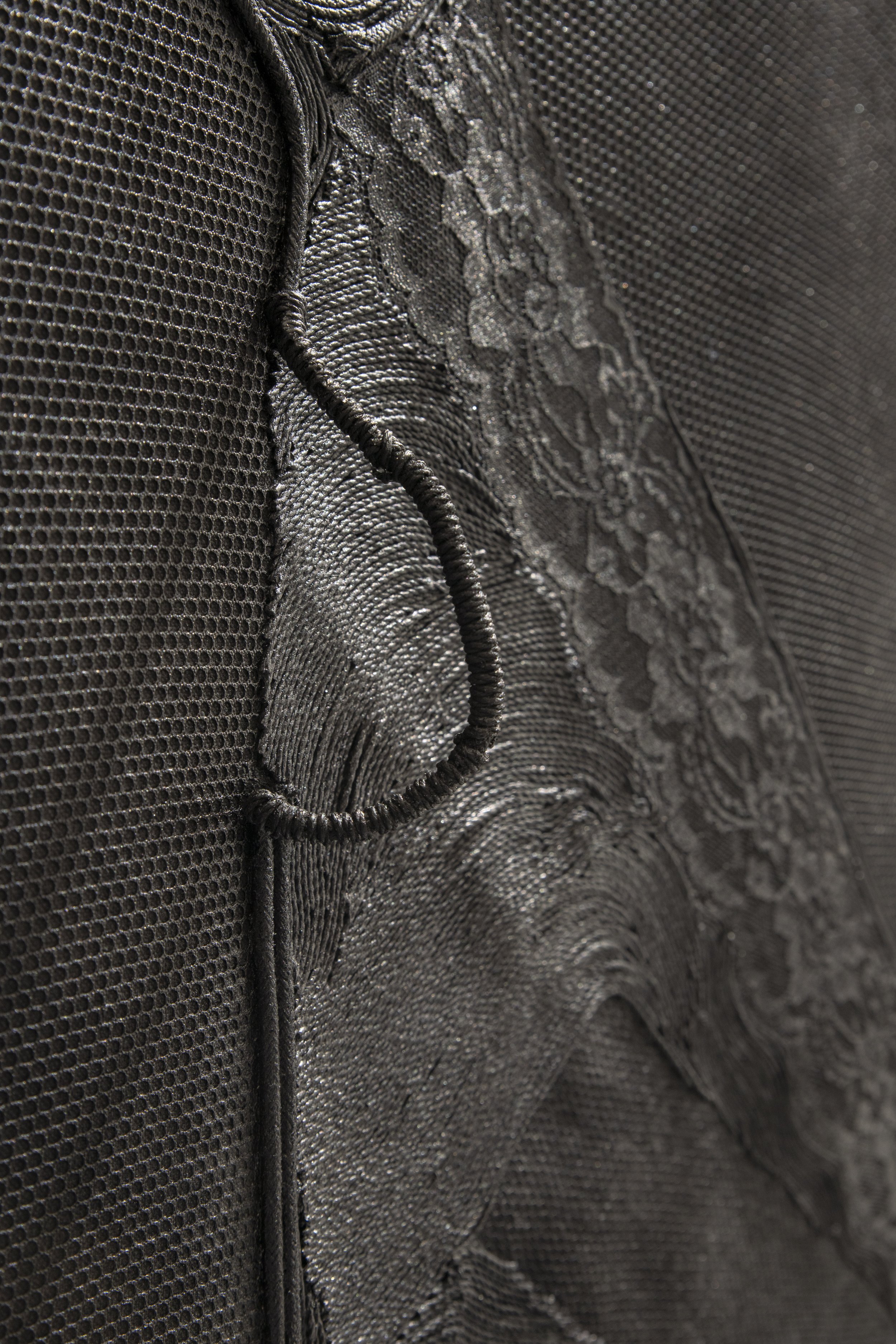
Photo: Gene Ogami.
Other artists I am influenced by and passionate about include the English Painter Celia Paul, The Canadian Artist Agnes Martin, The French-born artist Louise Bourgeois, and the American artist Liza Lou. I also love many others including Lee Krasner, Jasper John, Robert Rauschenberg and Judith Scott.
I am drawn to artists who engage with intense materiality, and fascinated by those who break new ground and seem to invent something new such as Hesse with her use of latex and fiberglass and unusual, emotionally evocative combinations of materials; Salomon with her inventive integration of text, image and music; Lou’s use of beads in aggregation and engagement with labor, and what she terms, the “marathon of making”; Martin’s use of seriality, repetition, layering and almost sacred touch with materials; Krasner’s gesture, color and paint handling; Judith Scott’s incredible “wrappings” and use of thread, cord and string; Rauschenberg’s fantastic and telling material combinations; and John’s gravitas, strange break-ups of the body, investigation of reality, and again, material layering.
Tia Xu: Can you describe a challenging moment or obstacle you’ve encountered during your artistic journey and how you successfully overcame it?
Debra Disman: In 2012 my husband and I moved from the San Francisco Bay Area, where we had been for decades. We started over almost completely from scratch, though he had a contract job. I left my business of 15 years, and began teaching and building a social and studio practice. The way that I did it was step by step, working through each roadblock in an almost methodical manner, whether it be making an appointment to meet with someone, or working through a municipal bureaucracy! As I worked through each thing, I gained confidence in new area, discovered and developed more skill, met challenges and overcame obstacles. I had great excitement about the move, and was really ready for it, so that helped! I also focused on my teaching as a way to get established, procure gigs, jobs and project and contribute financially to our household, and did not put the pressure on myself to create art to sell. I wanted to be completely free in the studio to discover my own path and what came next, and step by step was able to achieve that and carve out a unique niche for myself in the panoramic LA Art scene, while learning, growing and meeting incredible people along the way!
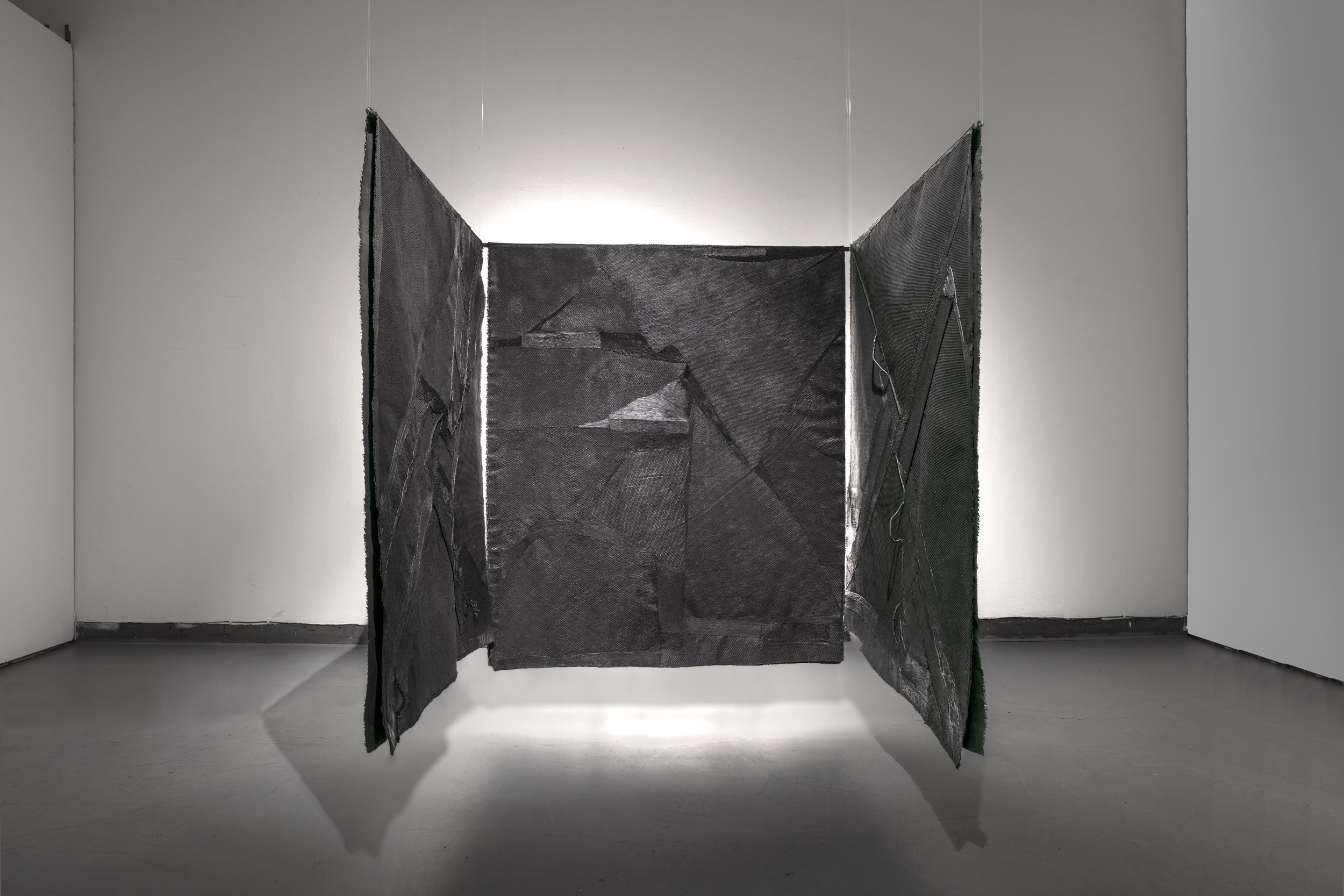
Photo: Gene Ogami.
Tia Xu: Are there any other series that you are currently working on? Would you mind sharing them with us?
Debra Disman: I am working on a three-panel work which can be presented in full that I am creating solely by gluing primarily hemp and cotton cord in related colors to large strips of hemp cloth which hang against the wall like unfurled vertical flags or scrolls. I like to work in threes, it is a satisfying yet odd number, both balanced and asymmetrical.
I am also trying to complete a large stitched work done on a green plastic landscaping tarp, and have two other bodies of work that I would like to start in series, one a white-on-white series of minimalist wall pieces that engage plaster, cloth and cord, and the other an experimental series wood pieces wrapped in cord, thread and string, inspired by the artist Judith Scott.
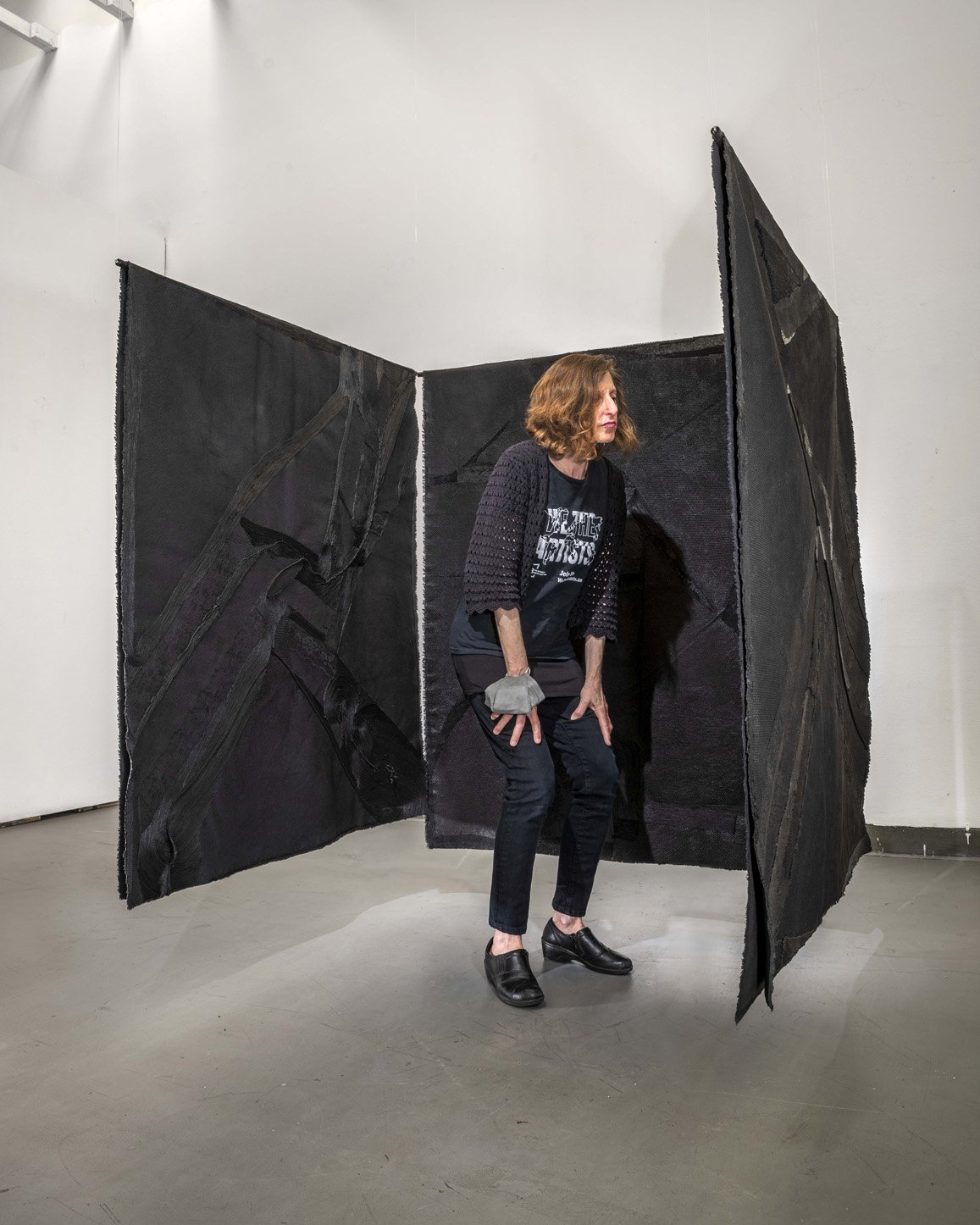
Photo: Gene Ogami.
As well, I would like to begin series of larger-scale blue-toned drawings. I have been working on the blue-toned drawings in sketch books on a small scale for several years, and would like to go bigger with them. These are different than much of my other current work, as they are not completely non-figurative as are my current book works, hangings, sculptures and installations; the blue drawings engage abstracted figures and landscapes in a range of blue hues and tones and I would like to see where they go, and if they can even translate to something bigger.
Will there ever be enough time to realize all these ideas? Well, Time and Life, will tell.
Tia Xu: Can you share a particular piece of feedback or a comment from an art critic, art professional, or even the audience that has profoundly impacted you?
Debra Disman: There have been many, but Juri Koll, founder of VICA /Venice Institute of Contemporary Art said: It was exciting that he “got” my love of and connection to “labor”.
“We approach the work not as a book, which has always been an integral part of Disman’s work, but as a sculpture. One takes note of the focus and care these works require, and subsequently the labor appears as a part of the story.” — Juri Koll

The Bridge Arts Foundation’s “SOLILOQUY” Exhibition Installation View, Photo: ©The Bridge Arts Foundation / Luna Hao
The “SOLILOQUY” Open Call Exhibition thoughtfully selected 18 talented artists from over 500 submissions, employing a selection process that involves art professionals. “SOLILOQUY” ran from from July 13th to August 17th, 2024.
ABOUT ARTIST
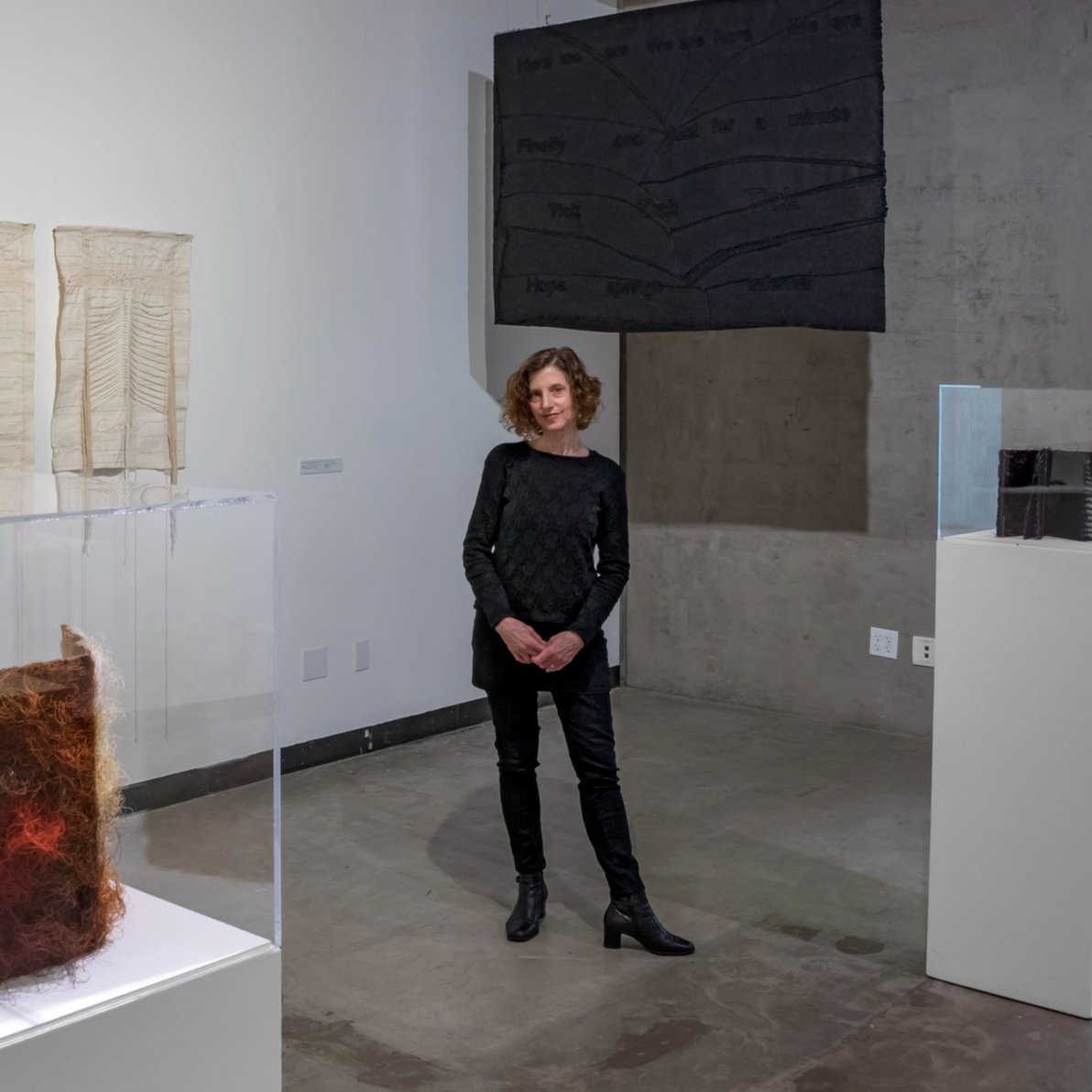
Photo: Gene Ogami
Debra Disman
Lives and Works in Los Angeles, California
“I am a Los Angeles-based artist known for my work inspired by the book, both as a solo practitioner and in the public sphere of community engagement. As a maker, teaching artist, researcher and writer I creates work and projects which investigate states of being and connectiveness through intensive engagement with materials, while attempting to fully explore and exploit their haptic properties.
A passionate social practice artist, I was the featured artist for the Big Read in LA in 2016 and the recipient of an inaugural WORD: Artist Grant / Bruce Geller Memorial Prize to create “The Sheltering Book”, a life-sized book structure designed as a catalyst for community creativity. I have been commissioned by LA’s Craft Contemporary Museum to create an interactive book for the 2017 exhibition, “Chapters: Book Arts in Southern California” and by 18th Street Arts Center to create the artists’ book, “Unfolding Possibilities” in 2021 in collaboration with the community at-large.”
